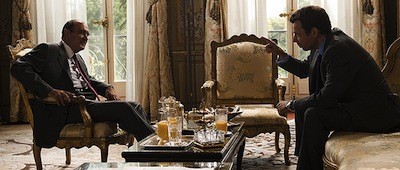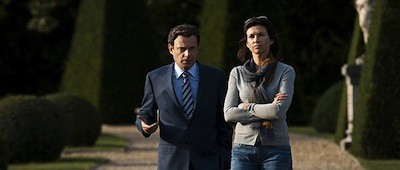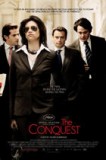| Reviews & Columns |
|
Reviews DVD TV on DVD Blu-ray 4K UHD International DVDs In Theaters Reviews by Studio Video Games Features Collector Series DVDs Easter Egg Database Interviews DVD Talk Radio Feature Articles Columns Anime Talk DVD Savant Horror DVDs The M.O.D. Squad Art House HD Talk Silent DVD
|
DVD Talk Forum |
|
|
| Resources |
|
DVD Price Search Customer Service #'s RCE Info Links |
|
Columns
|
|
|
Conquest, The

Entering the arena of political biopics is the recent French film The Conquest, a dramatized take on Nicolas Sarkozy's ascent to the Presidency. Written by Patrick Rotman and directed by Xavier Durringer, it chronicles the period between 2002 and 2007, from the moment that his predecessor, Jacques Chirac, tried to sideline the ambitious Sarkozy by making him the Minister of the Interior instead of Prime Minister to the election day five years later when Chirac was out and Sarkozy moved in.
Denis Podalydès (Park Benches) stars as the politician. He plays Sarkozy as a gruff little man, stooped in the shoulders, constantly glowering, and gesticulating like a Scorsese gangster. The Conquest opens with him alone in a room, anxious for the results of the vote, nervous about whether his estranged wife, Cécilia (Florence Pernal), will turn out to support him. The script zings between these anxious hours and the highlights of Sarkozy's determined rise to power. He battles with Chirac (Bernard Le Coq) and his dutiful PM, Dominque de Villepin (Samuel Labarthe), over labor issues, public relations maneuvers, and general political posturing. Rotman's narrative rarely focuses on policy, instead looking at the backroom chess games, including the nasty insults these gentlemen toss at each other, be it behind closed doors or face to face.
Sarkozy is shown as a scrapper, a savvy politician with a modern media machine and a rhetoric that peddles hope and change in ways not dissimilar to the Barack Obama campaign that followed shortly after. As a husband and boss, Sarkozy can be petty and self-indulgent. Indeed, he seems to have little in life beyond these roles, at least as shown here, and at times that can seem like a failing of the movie as much as it might be of the individual. As his power grabs escalate, Sarkozy eventually alienates his wife, but Céclia's affair with another man seems like a symptom to a disease that is never really addressed. As one of his most trusted advisors, her departure from the campaign is shown as quite a blow to the effort. Yet, the disparity between broken-hearted Sarkozy and the political shark who wheels and deals to get her back in the fold is never really addressed, nor are her accusations that he was also unfaithful. (His relationship with Carla Bruni began after the timeline depicted in The Conquest.)

It's hard to tell if this lacking is cinematic shorthand or a purposeful suggestion that the subject is little more than a political automaton incapable of meaningful human connections. I suppose the latter is possible, as The Conquest's lack of any ideological substance paints Sarkozy as a career campaigner not unlike Mitt Romney: his only conviction with any constancy is his belief that he should be President. For viewers like me who lack much of a working knowledge of French politics, there is a lot of wriggle room to interpret as you may. Perhaps French audiences didn't need any explanation of their leader's actions. I have one French colleague who said The Conquest played over there as an unintentional comedy, with the cast's seemingly earnest performances coming off as poor caricature.
I don't know. To my eyes, The Conquest falls somewhere in between the satirical critique of Oliver Stone's W. and the kid-glove poo-pooing of the Peter Morgan-scripted British dramas featuring Tony Blair (The Queen, The Special Relationship). There seems to be something dangerous in making movies about current political figures. The profiled subjects work some kind of seductive voodoo on the filmmakers so that they start to feel sympathy for their targets and fail to maintain a clear point of view.
Which doesn't stop The Conquest from being compelling viewing. Rotman and Durringer's reluctance to explain means that once the drama begins, there is no real downtime. They expect you to stay sharp and keep up, and that makes watching Sarkozy volley back and forth with his rivals kind of riveting. These are men who are wrestling for some pretty big toys but doing it on an entirely personal level. It's actually rather cynical when you think about it. These hollow figureheads are completely interchangeable and regardless of who comes out on top, it probably won't make much of a difference to the vast citizenry who voted them there. In modern politics, we all end up on the bottom.

Jamie S. Rich is a novelist and comic book writer. He is best known for his collaborations with Joelle Jones, including the hardboiled crime comic book You Have Killed Me, the challenging romance 12 Reasons Why I Love Her, and the 2007 prose novel Have You Seen the Horizon Lately?, for which Jones did the cover. All three were published by Oni Press. His most recent projects include the futuristic romance A Boy and a Girl with Natalie Nourigat; Archer Coe and the Thousand Natural Shocks, a loopy crime tale drawn by Dan Christensen; and the horror miniseries Madame Frankenstein, a collaboration with Megan Levens. Follow Rich's blog at Confessions123.com.
|
| Popular Reviews |
| Sponsored Links |
|
|
| Sponsored Links |
|
|
| Release List | Reviews | Shop | Newsletter | Forum | DVD Giveaways | Blu-Ray | Advertise |
|
Copyright 2024 DVDTalk.com All Rights Reserved. Legal Info, Privacy Policy, Terms of Use,
Manage Preferences,
Your Privacy Choices | |||||||











